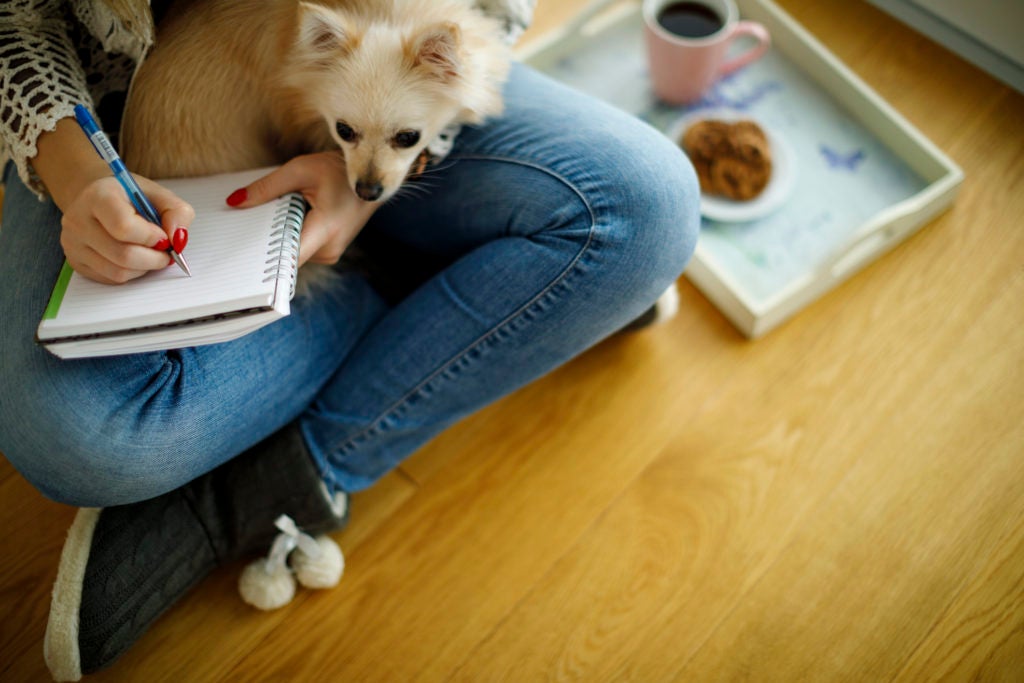
All dog lovers know the healing power of a pup’s hug, but Anne Ingalls Gillespie knows it better than most. As a pediatric oncology nurse, she’s spent her career caring for children with life-threatening conditions. Therapy dogs and their trained handlers work their magic all over the hospital where Gillespie works, Children’s Hospital Colorado, spreading love and joy to children battling illness.
All over the hospital, that is, except the Center for Cancer and Blood Disorders. Owing to the risk of infection, the hospital made the tough call to ban doggy visitors to the unit 17 years ago.
But having seen the power of pet therapy in the rest of the hospital, Anne wanted to allow the patients on her floor to experience some puppy love, too. So in 2001, she established Youth and Pet Survivors (YAPS), a pen pal program that matches young people battling cancer with dogs or cats who have survived cancer or another life-threatening illness.
Since then, around 150 patients have been matched with furry pen pals. At any one time, there are around a dozen pairs getting to know each other through YAPS. Of course, the dogs and cats in the program need a little help writing their letters, which is supplied by their owners.
The Benefits of Pet Pen Pals
The program has been a roaring success. Anne has seen her patients enjoy many of the recognized benefits of more traditional forms of animal therapy: happiness, distraction, entertainment, and the same feel-good factor you’d get from a real, live visit from a dog. But that’s not all: children in the program have also found great comfort in building friendships with their furry pen pals that unfold over time.
As their friendship grows, the children often come to trust their correspondent, sometimes confiding things they might have trouble sharing in other relationships. “My body isn’t producing blood cells so I am having a bone marrow transplant,” one young person wrote to their dog friend Spree. “My sister is my doner… I feel scared, nervous, and excited.” “I miss you so so much,” another young patient wrote to her pen pal Maggie—her BDFF (“best doggy friend forever”).
One patient in Anne’s unit was excited to discover that her pen pal had osteosarcoma—the same kind of cancer she had—and that they received the same kind of chemotherapy. Bonding over this shared experience gave the girl hope and courage, about not just her illness but also her recovery. “They were like kindred spirits,” Anne says, recalling the joy child and dog took in sharing notes on learning to walk again, how to have fun in recovery, and what made them feel better.
Though the pairs can meet after corresponding for several months, the real focus and benefits of the program are in these lasting, trusting relationships, developed through writing letters.
Creating Lasting Friendships
And it’s not just the children who benefit. “It usually is a great experience for the pet owner,” Anne says. “Many of them say, ‘My gosh, it’s the best thing I’ve ever done,’ or, ‘I feel like my dog or cat’s cancer now has meaning.’ It’s really a positive experience for them.”
Sometimes, the program creates friendships that endure through the years, even after the letter writers have passed. Anne recalls a Mastiff and a teenage girl who spent the last year of their lives developing a close and beautiful friendship through letters, even finally meeting. When the girl tragically passed, the Mastiff’s family attended her funeral. A month later, the Mastiff passed, too, but the families still get together, years later—sharing a lasting friendship and source of support through their grief.
Anne is careful to point out that not all matches result in such transformative friendships. “Those are the special, magical, unpredictable friendships that happen,” she says, but sometimes young people in the program, though they love receiving letters from their furry pen pals, aren’t able to write back much. “They have to be special people too, the people that write on behalf of their dog or cat,” Anne says. “We ask them to be very altruistic and very willing to engage, even if they’re not getting a lot of engagement back,” Anne notes. For the families of pets, then, YAPS is, above all, an opportunity to spread the joy of their furry family member to children facing difficult situations.
What’s next for YAPS?
This is just the beginning for YAPS. A research study currently underway will give scientific evidence of YAPS’ impact on the lives of children with cancer. And Anne notes that the model could expand to other hospitals. “That’s our plan, but we need the resources to do it,” Anne says.
Luckily, some resources are already on the way. The Colorado Kennel Club will be honoring YAPS at this year’s dog show, Feb. 14–18. To see Anne collect a donation that will spark more healing friendships, find Anne at the Group Judging rings at 3 p.m. on Sunday, Feb. 17.


